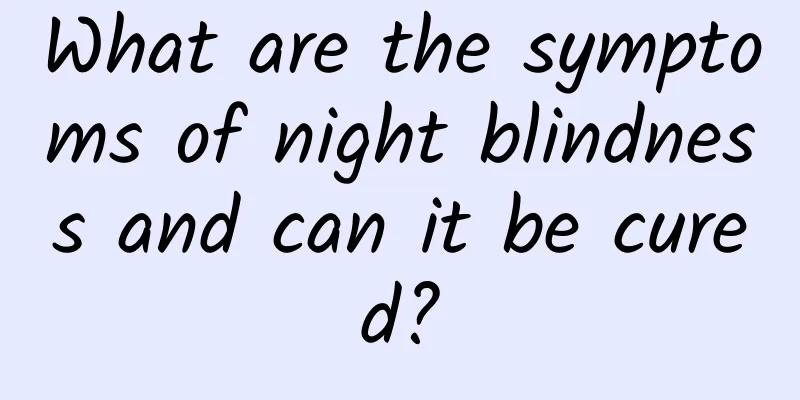What are the symptoms of night blindness and can it be cured?

|
Many people have this symptom: their vision is normal during the day or in well-lit conditions, but at night or in dimly lit environments, their vision is no different from that of a blind person. This is the so-called "night blindness". I believe everyone is familiar with night blindness. Night blindness can bring a lot of troubles to patients' daily lives, such as difficulty walking at night and inability to drive a vehicle. This article will help you understand what night blindness is, what are the symptoms, and whether it can be cured? Night blindness, commonly known as "night blindness", is a visual disorder characterized by a significant decrease in vision in dim light or at night, or basically no ability to see. It is mainly caused by poor development of rod cells or lack of vitamin A. What are the symptoms of night blindness? 1. Decreased vision at night or in dimly lit environments: Night blindness patients cannot see objects clearly at night or in low-light environments, and their vision is significantly reduced. 2. Unable to adapt to low-light environments: When patients move from a bright environment to a dark environment, their vision cannot adapt quickly, making it difficult to see surrounding objects clearly. 3. Difficulty walking at night: Night blind patients may get lost, fall or collide with obstacles when walking at night because they cannot see the surrounding environment clearly. 4. Excessive photophobia: Patients may avoid bright light due to strong glare or excessive sensitivity, which may affect the ability of night blind patients to move in different lighting environments. 5. Difficulty in recognizing road signs or traffic signs: People with night blindness may find it difficult to recognize road signs, traffic signs or other information necessary for driving when driving at night, which may affect their driving safety. 6. Early or delayed scotopic vision: In addition, night blindness patients may take longer to adapt to scotopic vision when switching from a bright environment to a dark environment, or have slower visual recovery when switching from a dark environment to a bright environment. Can night blindness be cured? Night blindness is generally related to hereditary diseases, and there is no more effective treatment method. Patients can wear protective glasses to help relieve symptoms. Treatment for night blindness depends on the specific cause of the symptoms. Vitamin A deficiency or other nutritional problems, for example, can be treated with appropriate vitamin A supplements or dietary adjustments. In this case, night blindness symptoms may improve or disappear as the cause is corrected. For night blindness caused by genetic factors or eye diseases, such as retinitis pigmentosa, the treatment process may be more complicated. Although some genetic eye diseases cannot be cured at present, regular monitoring, control of disease progression and appropriate treatment intervention can delay disease progression, alleviate symptoms and maintain vision. Some auxiliary measures can also help night blind patients better adapt to low-light environments, such as wearing special glasses, using night vision equipment, increasing lighting, etc. These measures can improve the night vision of night blind patients and reduce inconvenience and danger. What should people with night blindness eat more? It is very important for people with night blindness to get enough vitamin A in their diet, as it is necessary for maintaining healthy vision. Here are some foods rich in vitamin A: 1. Cod liver oil: Cod liver oil is one of the important sources of vitamin A. 2. Yellow or orange vegetables: Carrots, pumpkins, red peppers, sweet potatoes, etc. are rich in beta-carotene, which is a precursor of vitamin A and can be converted into vitamin A. 3. Green leafy vegetables: Green leafy vegetables such as spinach, kale, and beet leaves are rich in chlorophyll and vitamin A. 4. Fruits: Citrus fruits, apricots, raisins, etc. contain high levels of vitamin A. 5. Dairy products: Milk, yogurt, cheese and other dairy products are rich in vitamin A. In addition to vitamin A, several other nutrients are also beneficial to visual health, including vitamin C, vitamin E, and zinc. These nutrients are found in fresh fruits, nuts, seeds, whole grains, meats, and vegetables. While a moderate intake of these foods and nutrients may help maintain healthy visual function, please be aware that diet alone cannot completely cure symptoms in individuals diagnosed with night blindness. It is important to seek medical advice and follow the comprehensive treatment and management recommended by your doctor. Note for patients with night blindness: Avoid nighttime activities: Try to avoid activities that require clear vision in dim light or at night, such as driving a vehicle or doing outdoor activities at night. If you must go out at night, try to use auxiliary light sources or assistive tools such as night vision equipment. Increase lighting: Ensure adequate lighting in your home, office, or other indoor environment to improve vision. Use bright lights and appropriate lighting fixtures, such as table lamps, wall lamps, or floor lamps. Eat a balanced diet: Maintain a balanced diet with adequate nutrients, especially foods rich in vitamins A, C, E and zinc. Following a healthy diet is important for maintaining visual health. Prevent glare: For people with night blindness, glare can exacerbate symptoms. Try to avoid direct exposure to bright light, such as the sun or high beams of a vehicle, both during the day and at night. In short, although night blindness symptoms may not be completely curable, through appropriate treatment and management, many patients can effectively control symptoms, reduce the impact, and improve their quality of life. The views in this article only represent personal opinions. What needs to be paid attention to is to see a doctor as soon as possible, seek the advice of a professional doctor, and undergo a comprehensive eye examination to determine the cause and develop the best treatment plan. (Zheng Jinpu, Lingshou County People's Hospital, Shijiazhuang City, Hebei Province) |
<<: Family planning and contraceptive knowledge class
Recommend
What happens in your brain when you see likes on your Moments?
When teenagers see their photos get lots of "...
What to do if your period is too little
Too little menstrual flow is a problem that many ...
How to pickle dried white radish? How to remedy the bitterness of pickled white radish
The more common large varieties of white radish i...
How to store fresh peaches? How to store peaches when they are soft?
Peaches are known as "longevity peaches"...
How does Traditional Chinese Medicine treat uterine fibroids?
Uterine fibroids are a relatively common gynecolo...
What causes follicular atrophy? These are the culprits
For some women, their follicles will shrink inste...
What are the treatment and prevention drugs for children infected with respiratory syncytial virus?
In autumn and winter, respiratory viruses are pre...
I have been taking ibuprofen for 5 years for dysmenorrhea
Dysmenorrhea refers to lower abdominal pain and h...
The secret of maintaining a healthy life for 40-year-old women
Aging is a natural law for everyone. As the human...
How can people with diabetes eat Zongzi safely? When buying Zongzi online, check the time at 2 o'clock before buying
I wish you all a happy Dragon Boat Festival! &quo...
Psoriasis: A Challenging Skin Disease
Psoriasis, a seemingly ordinary term, hides many ...
Overwork, anxiety and stress are the triggers of sudden death! The truth you must know about sudden death
Recently, the news that a 22-year-old girl in Han...
Is it good for women to eat grapes during menstruation?
During menstruation, women should pay attention t...
Why are women's feet cold in summer?
We all know that women are more likely to suffer ...
Can pregnant women drink crucian carp tomato soup?
Pregnant women can usually drink crucian carp and...









